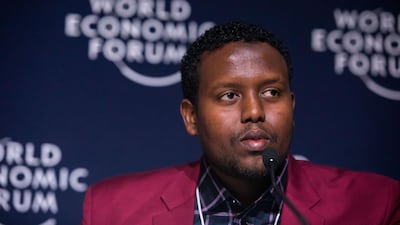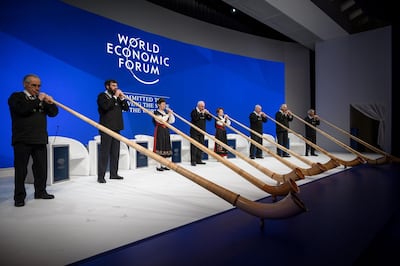The World Economic Forum on Tuesday morning heard from a powerful and compelling voice representing the disenfranchised, who urged private sector companies to help give refugees equal access to opportunities or risk condemning another generation to a life of dependence in camps.
As its Annual Meeting in Davos got underway, forum organisers introduced the media to this year’s event co-chairs, predominantly inspirational young leaders from Iraq, the US, Sweden, Japan and Colombia.
Among them is Mohammed Hassan Mohamud, a Somalian refugee who has spent the last 20 years living among the 185,000 in the Kakuma camp in north west Kenya, said that he and his people feel like they are on the side-lines of the debate over the future of the world economy.
The theme of this year's meeting is ‘Globalisation 4.0: Shaping a Global Architecture in the Age of the Fourth Industrial Revolution’, asking the question of how to make it inclusive and sustainable for all.
Mr Mohamud said that it appeared the world was putting more effort into the ethics of using technology including automation, AI and robots than towards alleviating human suffering.
"Refugee camps are not ethical – it kills people and kills their spirit. That’s what keeps me up at night. Will I spend the next 20 years in the camp? What is at stake here [in Davos] is crucial,” he said.
His message for the private sector is that companies and not governments should be responsible for giving refugees the tools and skills to be able to contribute to society.
“Look at me, I have no marketable skills,” he said, adding that food aid, or “beans for people” perpetuated a mentality of dependency which undermined refugees’ ability to chase their dreams and aspirations.
“We are not asking for too much, just equal opportunity,” he said.
He said he hopes while in Davos to help demystify the refugee experience amid the growing animosity in Europe and North America towards the issue of migration.
“What are you all afraid of? It is not a crime to flee from your country,” he said.
There are more people displaced today than at any time in modern history, accounting for around 1 per cent of the world’s population or nearly 70 million, and the Middle East and North Africa area is the most impacted region.
Mr Mohamud’s human-focused message to the forum struck somewhat of a contradictory tone to the technology-led opening comments of the panel discussion by Microsoft chief executive Satya Nadella, also a meeting co-chair.
“The world is becoming a computer,” he said before describing the powerful force for equitable change that could be harnessed through technology including access to education and healthcare and the empowering of people with disabilities.
Mr Nadella did concede however that while embracing technology offered opportunities for economic growth that “bringing hope for people will be the real test”. He hoped that this would be discussed this week.
Climate change will also be an emotive subject at the meeting. Noura Berrouba, a leader in Europe’s youth parliament and a co-chair in Davos, said it was time to “step up on climate change or step-aside”.
“The number one priority is to accelerate climate change action. We won’t be silent bystanders [anymore],” she said.
However, she conceded that while the issues that needed to be tackled were clear that the “how is difficult” as institutions around the world that traditionally solved problems have been undermined.
“We can’t fix the problem if we can’t fix the process,” said Ms Berrouba.
It is expected that there will be further – if healthy – tension in terms of conflicting points of view on the main stage in Davos on Tuesday. An address from Brazil’s President Jair Bolsonaro, a vocal climate change sceptic will follow a discussion about the imminent environmental crisis the planet is facing, between Sir David Attenborough and Britain’s Prince William.
______________
More from Davos:
Mike Pompeo says Middle East coalitions vital to countering Iran
Sir David Attenborough warns of limitless environmental harm




